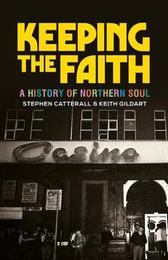
|
Keeping the Faith: A History of Northern Soul
Hardback
Main Details
| Title |
Keeping the Faith: A History of Northern Soul
|
| Authors and Contributors |
By (author) Keith Gildart
|
|
By (author) Stephen Catterall
|
| Physical Properties |
| Format:Hardback | | Pages:320 | | Dimensions(mm): Height 216,Width 138 |
|
| Category/Genre | Soul and R 'n' B |
|---|
| ISBN/Barcode |
9780719097102
|
| Classifications | Dewey:306.4842440942709047 |
|---|
| Audience | | Tertiary Education (US: College) | | Professional & Vocational | |
|---|
|
Publishing Details |
| Publisher |
Manchester University Press
|
| Imprint |
Manchester University Press
|
| Publication Date |
18 August 2020 |
| Publication Country |
United Kingdom
|
Description
In the 1970s, Northern Soul held a pivotal position in British youth culture. Originating in the English North and Midlands in the late-1960s, by the mid-1970s it was attracting thousands of enthusiasts across the country. This book is a social history of Northern Soul, examining the origins and development of this music scene, its clubs, publications and practices. Northern Soul emerged in a period when working class communities were beginning to be transformed by deindustrialisation and the rise of new political movements around the politics of race, gender and locality. Locating Northern Soul in these shifting economic and social contexts of the English North and Midlands in the 1970s, the authors argue that people kept the faith not just with music, but with a culture that was connected to wider aspects of work, home, relationships and social identities. Drawing on an expansive range of sources, including oral histories, magazines and fanzines, diaries and letters, this book offers a detailed and empathetic reading of a working class culture that was created and consumed by thousands of young people in the 1970s. The authors highlight the complex ways in which class, race and gender identities acted as forces for both unity and fragmentation on the dance floors of iconic clubs such as the Twisted Wheel in Manchester, Blackpool Mecca, the Torch in Stoke-on-Trent, the Catacombs in Wolverhampton and the Casino in Wigan. Marking a significant contribution to the historiography of youth culture, this book is essential reading for those interested in popular music and everyday life in in postwar Britain.
Author Biography
Stephen Catterall is an Honorary Research Fellow in the Faculty of Arts, Business and Social Sciences at the University of Wolverhampton. He has written widely on British labour, social and cultural history. Keith Gildart is Professor of Labour and Social History at the University of Wolverhampton and co-founder of the Subcultures Network. He is the author of Images of England through Popular Music: Class, Youth and Rock 'n' Roll 1955-1976 and an editor of the Dictionary of Labour Biography. -- .
Reviews'Keeping the Faith's chronological examination of northern soul's first phase is extensively researched. Stephen Catterall and Keith Gildart deliver a history that presents an untold story that is indispensable for the understanding of an overlooked youth culture and influential underground music scene. Overall, it is a thought-provoking study which will no doubt influence the direction of futureresearch and provides a template for study into other neglected areas of popularmusic.' History 'Catterall and Gildart successfully present a nuanced picture of the heterogeneous everyday practices and rituals of northern soul in the 1970s. They indeed deliver on the aim of writing an unapologetically empathetic history from below, and persuasively using this case study to consider how to tell a story of working-class identity which focuses on leisure and pleasure rather than the traditional area of employment. It is an expansive contribution to the ongoing work by social historians of modern Britain and members of the Subcultures Network - including the authors - to take working-class leisure and identity seriously as categories of analysis for social change.' Freya Marshall Payne, Twentieth Century British History 'With this pathbreaking contribution, they have shown the significance of Northern Soul, and will hopefully inspire a new generation of historians to explore the many aspects of this and other comparable scenes and subcultures.' Dr Marc Collinson, Bangor University -- .
|